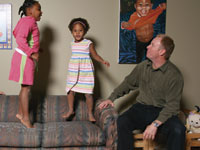
Launching updated adoption guidance last week, education secretary Michael Gove told social workers to stop waiting for “perfect” matches – based on adopters’ ethnicity, age or sexuality – before placing children. It was, he said, “social engineering of the worst kind”.
Although this angle garnered much media attention, it has not gone down so well with adoption experts and social workers.
Many believe the government has focused on an easy win but has done nothing to tackle issues such as the systemic delays and problematic post-adoption support which is leading to high rates of placement breakdown.
Jonathan Pearce, chief executive of Adoption UK, says there was “an element of the emperor’s new clothes” about the guidance: “Existing guidance already makes it clear that adoptions should not be delayed in pursuit of ‘perfect’ matches. It’s a training and practice issue, for one in three agencies at the most.”
Avoiding real issues
Claudia Wood, head of the public services and welfare programme at the think-tank Demos, believes the government is using the ethnic matching angle politically.
“They can blame social workers for being ‘too politically-correct’ and tell them to change, avoiding the real issues which are harder and more resource-intensive to tackle,” she said.
Wood added that more would have been achieved had the government’s focus centred on the current systemic delays in adoption.
“By the time every box has been ticked and everything assessed and agreed, we’re talking years, on top of the time spent taking the child into care and making a decision about adoption,” she said. “By the time children are ready to be adopted, they are often too old to be adopted successfully.
“Older children, who’ve spent their formative years in a dysfunctional birth family and in care, are much harder to parent. But there are plenty of adopters who want babies and very young children, and plenty of children known to social services at a young age.
“The real issue is less about the suitability of parents, than the suitability of children.”
Kevin Williams, chief executive of The Adolescent and Children’s Charity (TACT) said the government’s revised guidance offered little detail on post-adoption support, yet it is one of the biggest issues his charity faces.
About half of the 20 children the charity places for adoption every year are forced to wait as councils deliberate over the cost of post-adoption care. Often this results in the child never being placed.
“We have children with adoption plans who we can’t match with families because we haven’t been able to agree on a suitable package of post-placement support with the councils. They are worried about their budgets,” Williams says.
Long term needs
He also claimed assessments were failing to identify the long-term needs of children, which in reality often exceeded the statutory provision of three years. “The government’s guidance doesn’t contain much detail on post-adoption support,” he says. “It needs to be assessed better, resourced better and funded for longer than just the statutory three years.”
Despite this there is still hope among adoption social workers.
One local authority adoption team manager, who did not wish to be named, said: “[Children’s minister] Tim Loughton does seem to be aware of these issues so I am confident this government can start tackling them. But I’m disappointed the guidance didn’t offer more direction on this. A missed opportunity, I think.”
What do you think? Join the debate on CareSpace
Keep up to date with the latest developments in social care. Sign up to our daily and weekly emails
Related articles
Minister wants ombudsman for ‘contentious’ adoptions
Loughton casts doubt on Ofsted adoption inspections
Children’s minister condemns Telegraph adoption campaign
Inform subscribers
Reference Manual: Adoption support services in England and Wales


 Bournemouth, Christchurch and Poole
Bournemouth, Christchurch and Poole  Hampshire County Council
Hampshire County Council  Lincolnshire County Council
Lincolnshire County Council  Norfolk County Council
Norfolk County Council  Northamptonshire Children’s Trust
Northamptonshire Children’s Trust  South Gloucestershire Council
South Gloucestershire Council  Wiltshire Council
Wiltshire Council  Wokingham Borough Council
Wokingham Borough Council  Children and young people with SEND are ‘valued and prioritised’ in Wiltshire, find inspectors
Children and young people with SEND are ‘valued and prioritised’ in Wiltshire, find inspectors  How specialist refugee teams benefit young people and social workers
How specialist refugee teams benefit young people and social workers  Podcast: returning to social work after becoming a first-time parent
Podcast: returning to social work after becoming a first-time parent  Podcast: would you work for an inadequate-rated service?
Podcast: would you work for an inadequate-rated service?  Family help: one local authority’s experience of the model
Family help: one local authority’s experience of the model  Workforce Insights – showcasing a selection of the sector’s top recruiters
Workforce Insights – showcasing a selection of the sector’s top recruiters 

 Facebook
Facebook X
X LinkedIn
LinkedIn Instagram
Instagram
Comments are closed.